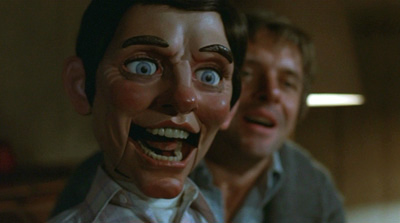***/**** Image B Sound B+
starring Donald Sutherland, Janet Suzman, Jürgen Prochnow, Marlon Brando
screenplay by Colin Welland and Euzhan Palcy, based on the novel by Andre Brink
directed by Euzhan Palcy
by Travis Mackenzie Hoover Belonging to the white-centred apartheid genre, '80s division, A Dry White Season is by far the best of a bad lot. At the time of its release, the film was widely–and rightly–criticized for being, like Richard Attenborough's Cry Freedom, more concerned with its Caucasian lead than with the more central but less bankable blacks who suffer by his side. But unlike Cry Freedom (or last year's dismal In My Country), A Dry White Season isn't about a heroic fait accomplis so much as an evolving conscience shedding its skin. Donald Sutherland's Ben du Toit actually comes off like a naïve dingbat in early scenes, convinced that the caning of his gardener's son was justified and that the various disappearances subsequent to the incident must have some logical, moral justification. The film's project is to show him that to fight the power, he has to give up everything–a message sure to strike fear in the hearts of armchair liberals everywhere.
Perhaps the difference is that this is the only Hollywood version of events with a black director at the helm, in this case Sugar Cane Alley's Euzhan Palcy, here facing the crossroads between festival fame and horrid Showtime originals. Though she's not exactly a stylistic powerhouse, her script (from the Andre Brink novel) is dogged in its insistence on unmasking the assumptions of a deluded white sap. Schoolteacher Ben is shown gently patronizing his black groundskeeper Gordon Ngubene (Winston Ntshona) in early scenes, happy to help but hardly talking as if they're equals. Indeed, he's not easily swayed when Gordon's son turns up dead after the Soweto riot/massacre of 1976. When Gordon himself is tortured and murdered after refusing to let things drop, however, Ben is forced to pick up the banner–and starts to see pieces of his life drop away from him.
This certainly isn't the burning core of anti-apartheid discourse, but it serves a purpose in demonstrating what has to happen to those at the top of the power structure. Ben isn't Atticus Finch on his fact-finding arrival in a Soweto slum, absolutely in control of the truth. Rather, he's a man completely stymied by the enormity of the issue, and the rest of the movie does its damnedest to shake his small-man's conviction to its core. Instead of a supportive wife, there is Janet Suzman's Susan, unconcerned with matters outside of her sphere and terrified of what the blacks might do should they ever receive their demands. And the film goes down a slippery slope as Ben tries to exhaust legal means–first through tired, cynical lawyer Ian McKenzie (Marlon Brando at his cheeky best), then by collecting affidavits for journalist Melanie Bruwer (Susan Sarandon)–only to watch his family, job, and very possibly his safety slip through his hands. Welcome to the front lines, sucker.
To be sure, there's a fair amount of point-missing going on: while the film is pretty good at blending black poverty and white privilege in the early scenes (not to be confused with setting up a binary dividing the two), by the end of the movie it's mostly Ben's show, save for a fairly tacky ending in which activist Stanley Makhaya (the supremely sly Zakes Mokae, criminally stuck in supporting roles) exacts revenge for all of the movie's victims. This underlines the cravenness of the Hollywood imperative that any social-issue picture has to have a representative of the (presumed white bourgeois) audience in order to seal the deal. Yet even though you want to throw up your hands when they introduce stone-faced Jürgen Prochnow as a monstrous policeman, the overwhelming feeling one takes away from A Dry White Season isn't one of smug self-satisfaction: there's enough awareness going on to establish not only that at least Ben du Toit has a choice, but that in order to change the situation, he must also lose that choice completely. If it's not the sort of thing that sells tickets to the Ghandi crowd, that's sometimes how things shake down.
THE DVDMGM/Sony's DVD release of A Dry White Season is merely adequate. Colour issues plague the anamorphic, 1.85:1 image, with skin tones looking excessively pink and low-lit areas often possessed by a greenish tinge. The Dolby 2.0 Surround sound is reasonably fine, its sharpness balancing out a lack of potency. Trailers for The Great Escape, The Good, the Bad and the Ugly, and a roster of western titles round things out.
107 minutes; R; 1.85:1 (16×9-enhanced); English Dolby Surround; CC; English, French subtitles; DVD-9; Region One; MGM




![The Rocky Horror Picture Show (1975) + Shock Treatment (1981) [Bodice-Ripping Fabulous 3-Disc Set] - DVD 6a0168ea36d6b2970c017ee3d3e4d7970d](https://filmfreakcentral.net/wp-content/uploads/6a0168ea36d6b2970c017ee3d3e4d7970d.jpg)


![Chariots of Fire (1981) [Two-Disc Special Edition] - DVD Chariots of Fire (1981) [Two-Disc Special Edition] - DVD](https://filmfreakcentral.net/wp-content/plugins/contextual-related-posts/default.png)

